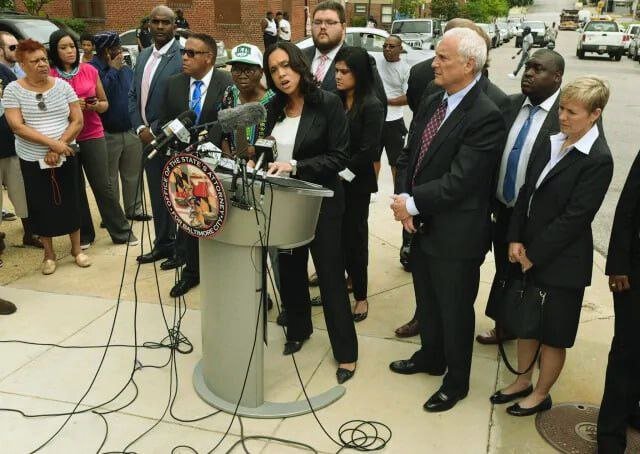Contents
Introduction to Marilyn Mosby
Marilyn Mosby, the former Baltimore City State’s Attorney, has been a significant figure in the legal landscape of Baltimore and beyond. Elected to office in 2015, Mosby was one of the youngest chief prosecutors in the United States at the time. Her tenure has been marked by a series of high-profile cases and ambitious reforms aimed at addressing systemic issues within the criminal justice system. Mosby’s prosecutorial career gained national attention during the Freddie Gray case in 2015, where she charged six police officers in connection with Gray’s death while in police custody. Her bold actions in this case drew both praise and criticism, highlighting the polarized reactions to her approach.
Throughout her career, Mosby has been an advocate for criminal justice reform. She has pushed for policies such as the decriminalization of marijuana possession, the establishment of conviction integrity units, and efforts to reduce mass incarceration. Her work has been recognized by various organizations, earning her accolades and establishing her as a notable reformist in the legal community. However, Mosby’s career has not been without controversy. Critics have accused her of overreaching in certain cases, and her office has faced scrutiny over case management and prosecutorial decisions.
Recently, Mosby has been embroiled in significant legal challenges that have cast a shadow over her career. These challenges include allegations of perjury and making false mortgage applications, leading to her indictment in federal court. As a result, she has been subjected to home confinement and asset forfeiture proceedings. These developments have sparked a debate about her legacy and the implications of her legal troubles for her future. This blog post aims to delve into the complexities of these legal challenges, exploring their ramifications and the broader context in which they unfold.

The Charges and Conviction
Marilyn Mosby, the former State’s Attorney for Baltimore City, faced a series of legal challenges that culminated in her conviction. The charges against her were multifaceted, primarily involving accusations of perjury and making false statements on loan applications. These charges stemmed from allegations that Mosby falsely claimed financial hardship due to the COVID-19 pandemic to withdraw funds from her retirement account without penalties. Additionally, she was accused of providing misleading information on mortgage applications for two vacation properties in Florida.
The legal proceedings began with an extensive investigation led by federal authorities. The prosecution argued that Mosby’s actions constituted a breach of public trust, highlighting her position of authority and the expectation of integrity that accompanies such a role. They presented evidence, including financial records and testimonies from financial experts, to substantiate their claims. The timeline of events was meticulously documented, starting from the initial withdrawal request in early 2020 to the finalization of the property purchases later that year.
On the defense side, Mosby’s legal team contended that the charges were politically motivated. They argued that the financial disclosures were misunderstood and that Mosby had acted within her legal rights. Testimonies from character witnesses and experts in financial law were brought forward to bolster her defense. The defense also attempted to cast doubt on the prosecution’s interpretation of the evidence, suggesting that the alleged infractions were administrative errors rather than deliberate deceit.
After a protracted legal battle, the court delivered its verdict. Mosby was found guilty on multiple counts of perjury and making false statements. The conviction not only led to her home confinement but also opened the door for asset forfeiture proceedings, further complicating her legal and financial standing. The case against Marilyn Mosby serves as a stark reminder of the rigorous standards public officials are held to and the severe consequences of legal violations.

Marilyn Mosby’s 1-year home confinement sentence carries several stringent conditions, as imposed by the court. Home confinement, often referred to as house arrest, is a form of incarceration where the individual serves their sentence within the confines of their home rather than in a traditional correctional facility. The court has outlined specific restrictions that Mosby must adhere to during this period.
Firstly, the conditions of Mosby’s home confinement include a curfew, which restricts her movements to within her residence for the majority of the day. Typically, exceptions might be made for essential activities such as medical appointments, religious services, or other court-approved activities. Mosby is required to wear an electronic monitoring device, usually an ankle bracelet, which tracks her location in real-time. This ensures compliance with the court’s restrictions and provides a means for authorities to verify her whereabouts at all times.
The implications of home confinement on Mosby’s daily life are significant. It limits her ability to engage in regular social activities, travel, and professional commitments. The constraints are designed to mirror the punitive nature of traditional incarceration while allowing for certain essential freedoms. However, the psychological and social impacts of such confinement can be profound, affecting both the individual and their family.
Home confinement sentences are typically guided by legal precedents and specific guidelines. Courts often consider factors such as the nature of the offense, the individual’s criminal history, and the potential risk to the community. In Mosby’s case, the decision reflects a balance between punishment and an acknowledgment of her unique circumstances. Historically, home confinement has been utilized as a means to reduce prison overcrowding and offer a more rehabilitative approach to sentencing.
Overall, Marilyn Mosby’s home confinement sentence represents a complex interplay of legal principles, aimed at ensuring compliance and punishment while considering the broader implications for her personal and professional life.
The Order to Surrender the Florida Vacation House
The court’s decision to require Marilyn Mosby to surrender her Florida vacation house is a significant legal development, rooted in the principles of asset forfeiture. Asset forfeiture is a legal process that allows authorities to seize property connected to criminal activity. In Mosby’s case, the vacation house, valued significantly, has been flagged as an asset potentially tied to unlawful conduct. This legal measure aims to disrupt the financial infrastructure potentially supporting criminal activities and serves as a deterrent against financial crimes.
The vacation house, located in a prime area of Florida, holds substantial value both monetarily and personally for Mosby. The court’s rationale for targeting this specific asset likely hinges on evidence suggesting that the property was either purchased with illicit funds or used to facilitate criminal activities. By ordering the forfeiture of the vacation house, the court underscores its commitment to ensuring that proceeds of crime are not enjoyed by those who engage in illegal behavior.
Enforcement of such orders typically involves a thorough review of the property’s ownership and financial records. Once the court issues the forfeiture order, authorities can move to seize the property, often involving local law enforcement to ensure compliance. This process is meticulously overseen to prevent any legal oversights and to guarantee that the forfeiture aligns with judicial standards.
Financially, surrendering the Florida vacation house represents a considerable loss for Mosby. The property, being a high-value asset, likely constitutes a significant portion of her wealth. This forfeiture could thus have a profound impact on her financial standing, potentially affecting her ability to maintain her lifestyle and meet other financial obligations. Personally, the loss of the vacation house could also carry emotional weight, as such properties often serve as personal retreats or family gathering spots.
Overall, the court’s order for Mosby to surrender her Florida vacation house is a critical juncture in her legal challenges. It not only reflects the stringent measures taken in asset forfeiture cases but also highlights the broader implications such legal decisions can have on an individual’s financial and personal life.
Reactions from the Public and Legal Community
The sentencing of Marilyn Mosby, coupled with the asset forfeiture, has provoked a spectrum of reactions from both the public and the legal community. These responses offer a window into broader societal views on justice and accountability, as well as the specific implications for the Baltimore community.
Public opinion on Mosby’s case is notably divided. Some members of the community view her sentencing as a necessary step towards ensuring accountability for public officials. They argue that no individual, regardless of their position, should be above the law. This sentiment is often echoed on social media platforms, where discussions about justice and integrity in public office are prevalent. On the other hand, there are those who see Mosby’s legal troubles as a reflection of deeper systemic issues. This group contends that she is being unfairly targeted and that her prosecution is politically motivated.
Legal experts have also weighed in on Mosby’s case, offering varying perspectives. Some legal scholars and practitioners commend the judicial process, emphasizing the importance of upholding the rule of law. They highlight that asset forfeiture, in particular, serves as a deterrent against corruption and misuse of office. Conversely, some critics within the legal community argue that the penalties imposed on Mosby are excessively harsh. They point to potential flaws in the legal system that may have influenced the outcome of her case, calling for a more nuanced understanding of her actions and the context in which they occurred.
Key stakeholders in Baltimore, including community leaders and local politicians, have expressed their views as well. For some, Mosby’s sentencing and asset forfeiture are seen as a significant blow to the city’s efforts to rebuild trust between public officials and the community. Others believe that this case underscores the need for continued vigilance and reform within local government structures. These reactions collectively highlight the ongoing debate about how best to achieve justice and accountability in Baltimore and beyond.
Potential Appeals and Legal Remedies
The conviction and sentencing of Marilyn Mosby present several opportunities for legal appeals and remedies. In the judicial system, the right to appeal is fundamental, allowing the convicted party to seek a review of the trial court’s decision by a higher court. Mosby may file an appeal on various legal grounds, such as procedural errors, misinterpretation of the law, or insufficient evidence to support the conviction. The appellate court will then examine the trial record for any legal mistakes that could have impacted the trial’s outcome.
To initiate an appeal, Mosby’s legal team must file a notice of appeal within a specified timeframe following the sentencing. This notice is a formal declaration of their intention to seek judicial review. Subsequent steps involve the preparation of an appellate brief, where the defense outlines the alleged errors and argues for a reversal or modification of the lower court’s decision. The prosecution will also submit a brief, defending the trial court’s ruling. Oral arguments may be scheduled, allowing both sides to present their positions before the appellate judges.
The outcomes of an appeal can vary. The appellate court may uphold the original conviction and sentence, reverse the conviction entirely, order a new trial, or modify the sentence. The success of Mosby’s appeal will hinge on the strength of the legal arguments presented and the appellate court’s interpretation of the law and trial proceedings.
Beyond appeals, there are other legal remedies available. Post-conviction relief, such as a writ of habeas corpus, may be sought if new evidence emerges or if there are significant concerns about the fairness of the trial. Additionally, Mosby’s legal team may explore the possibility of a pardon or commutation of sentence, although these are often rare and require executive intervention.
The likelihood of success for these legal remedies depends on numerous factors, including the specifics of the case, the quality of the legal arguments, and the discretion of the reviewing bodies. Nevertheless, the legal avenues available to Mosby provide a framework for challenging the conviction and seeking justice within the bounds of the law.
Impact on Career and Legacy
The legal challenges faced by Marilyn Mosby have profound implications for her career and legacy. As a prominent figure in the legal field, Mosby’s conviction and sentencing are likely to have significant repercussions on her future professional endeavors. Her role as the State’s Attorney for Baltimore City placed her at the forefront of high-profile cases and criminal justice reform initiatives. However, the recent legal issues could potentially undermine her credibility and authority within the legal community.
One of the primary concerns is how these legal challenges will affect Mosby’s public image. Known for her advocacy for police accountability and criminal justice reform, her conviction may cast a shadow over her previous contributions. Public perception is crucial for any public official, and the negative publicity surrounding her case could erode public trust. This erosion of trust could, in turn, impact her ability to effectively lead and participate in future legal or political endeavors.
Moreover, the broader implications for public officials facing legal scrutiny cannot be ignored. Mosby’s case serves as a cautionary tale, highlighting the intense scrutiny and potential consequences that public officials may face when their actions come under legal investigation. It underscores the importance of transparency and accountability in public office, as legal challenges can swiftly shift public opinion and alter career trajectories.
Despite these challenges, it is essential to acknowledge Mosby’s contributions to criminal justice reform. Her efforts to address systemic issues within the legal system have left a lasting impact. However, the ongoing legal battles might overshadow these contributions, making it challenging for her to continue her work in this field. Future opportunities within the legal domain may be limited, and her legacy could be redefined by the outcome of her legal proceedings.
In essence, the legal challenges faced by Marilyn Mosby have far-reaching implications for her career and legacy. The effects on her future in the legal field, her public image, and her contributions to criminal justice reform are significant and complex, reflecting the broader consequences for public officials under legal scrutiny.
Conclusion: Lessons and Reflections
The case of Marilyn Mosby has illuminated several critical issues within the legal and political spheres. Her journey from a renowned legal figure to facing home confinement and asset forfeiture serves as a cautionary tale for individuals in positions of power. The importance of ethical conduct and transparency in public service cannot be overstated. Mosby’s situation underscores the necessity for public officials to maintain high standards of integrity, as their actions are subject to intense scrutiny and can have far-reaching consequences.
Furthermore, the legal challenges Mosby faces highlight significant aspects of the justice system, including the processes of asset forfeiture and the implications of home confinement. These legal mechanisms, while designed to ensure accountability, also raise questions about fairness and due process. For instance, asset forfeiture, in particular, has been criticized for its potential to be misused, sometimes punishing individuals who have not been convicted of a crime. Mosby’s case brings these debates to the forefront, suggesting the need for reforms that balance accountability with fairness.
Looking ahead, the future of Marilyn Mosby remains uncertain. Her ability to navigate these legal troubles will likely impact her career and public perception. However, her case serves as an essential reminder of the enduring need for accountability in public service. Public officials must recognize that their actions have significant implications not only for their careers but also for public trust in the institutions they represent. Ensuring transparency and adhering to ethical standards are fundamental to maintaining this trust.
In conclusion, Marilyn Mosby’s legal challenges offer valuable lessons for both individuals in positions of authority and the legal system. They emphasize the critical importance of integrity and accountability in public service, and the need for ongoing scrutiny and potential reform of legal processes to ensure they are just and equitable.
OUR SITE: toinewsalert.com
Ryan Garcia Threatens to Quit Boxing After Positive PED Test Results: A Deep Dive:
Ryan Garcia Threatens to Quit Boxing After Positive PED Test Results: A Deep Dive
Chris Hemsworth Honored with Star on Hollywood Walk of Fame:
Jeremy Renner claims that during the horrifying snowplough accident that resulted in 38 broken bones, his eyeball was out:

